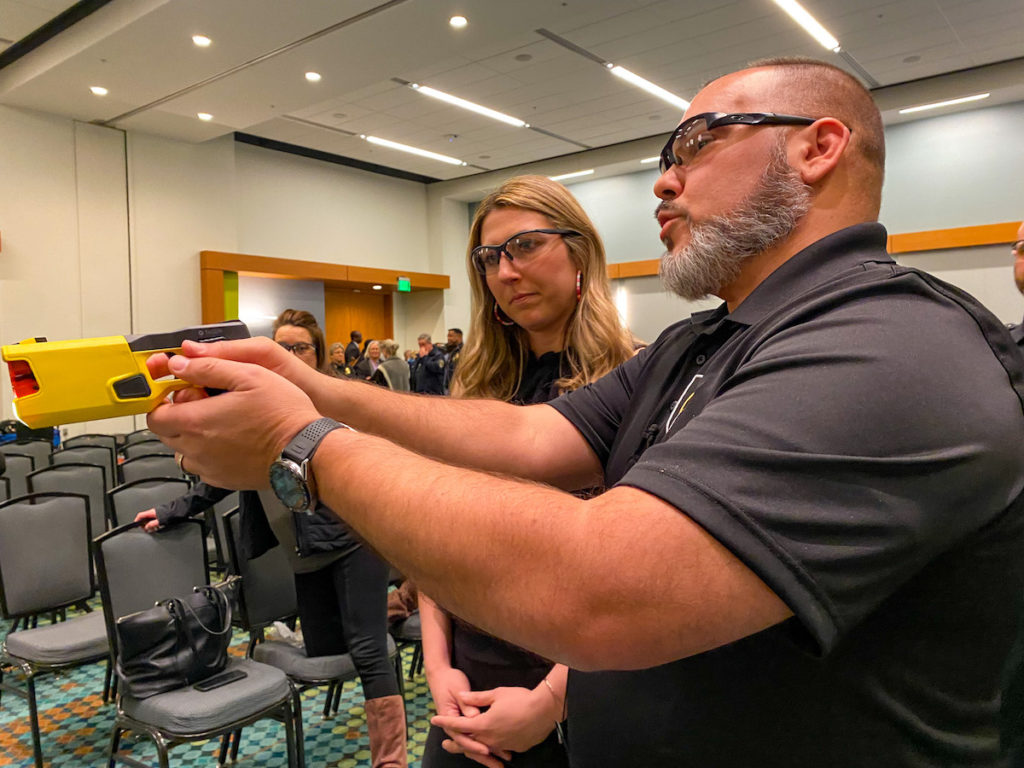
Nashville’s Metro Council has rejected a $24 million contract that would have provided the police department with new Tasers.
In past years, requests from the department have tended to get swift approval.
“I’ve never known the council to reject any request from the MNPD,” says Councilmember Delishia Porterfield.
As the leader of the council’s Budget and Finance Committee, Porterfield was in charge of bringing forward the contract this week, though she was vocally opposed and ended up voting against it. In discussion, she pointed out the inconsistency in how the council allocates funds.
“MNPD is the only department that we have refused to say no to, and we treat them as if they have unfettered access to the coffers,” she said Tuesday. “We tell parks ‘no,’ we tell schools ‘no,’ we tell fire ‘no,’ we tell the Metro Action Commission ‘no’, we tell the arts and animal control ‘no,’ and we tell Metro employees ‘no’ all of the time.”
Metro Council and police funding
The newly seated council has shown willingness to scrutinize police funding.
In the first meeting of the term, a resolution to accept state dollars to place school resource officers in all public middle and high schools sparked a lengthy debate. The council eventually opted to delay a vote, allowing for more time to review the $3.3 million. It later passed 23-12, with two abstentions.
The prior council also passed a host of police supports — from a pilot program for license plate readers to the last round of Tasers purchased for the department.
But public resistance has been strong, including consistent calls since 2020 to shift funding from police departments toward resources that support public safety in other ways – like mental health resources or affordable housing.
Yet every police budget since 2020 has seen an increase in funding. All budgets require Metro Council approval.
For Tasers, it’s not the first time they’ve sparked debate. At the start of 2022, MNPD requested $6 million in new Tasers and suggested that these funds comes from federal pandemic relief dollars. While the White House had approved pandemic assistance to be used for violence prevention, city officials received pushback from the community and within the council chambers on what the city’s priorities were for the pandemic money.
Eventually, the council approved a portion of this money to come from the city budget.
Concerns with latest contract
Less than two years later, the revised Taser contract was a sticking point for some councilmembers at Tuesday’s meeting.
Currently, Metro has a $6.5 million contract with Axon Enterprise, which supplied MNPD with 1,400 models of the TASER 7 in 2022.
The new contract was proposed at $24.8 million and would have outfitted MNPD with the latest technology, the TASER 10, for the next ten years. Axon asked Metro to agree to the contract by the end of the year.
Councilmembers who supported the new contract said this was an opportunity to “lock-in” 2023 prices for the next decade.
“I know there’s frustration that the company is not letting us defer out past January. To be quite frank with everyone, they don’t need to,” said Councilmember Courtney Johnston, one of the sponsors of the bill. “They’re the only game in the country, or the world, so they’ve got huge demand for this technology because it is so superior to what’s out there now. So, there’s no reason to honor 2023 pricing in 2024.”
Opponents argued there was no need to lock in a new, rushed contract, when the department’s existing Tasers still have three years left in their lifespan. Others pointed out that the newest technology may not remain relevant for the duration of the ten-year contract.
“Why are we rushing to stop using the ones that we have and buy new ones — ones that we know we might not even need?” Councilmember Zulfat Suara asked. “It’s not adding up for me.”
Reasoning the rejection
The bill was ultimately voted down, 14-24, with one member abstaining — a decisive rejection from the new council.
Porterfield, who is serving her second term, attributed the decision to a few different factors. She cited the nature of the contract — it’s high-dollar amount, the tight timeline, questions around safety — and, what she called, a “progressive wave.”
Porterfield pointed to the elections of Mayor Freddie O’Connell and Vice Mayor Angie Henderson as examples.
The mayor’s office said that the administration did not have a stance on the contract because it was not a new appropriation, but technically an amendment to an existing contract. O’Connell did not hold any meetings with councilmembers to discuss the contract.
“I do think that you have a more progressive council that will want to look more comprehensively at how we’re spending our funding, how we’re prioritizing our funding and how we can keep people safe,” Porterfield said. “That includes multiple ways of keeping people safe, not just the traditional way of policing.”



